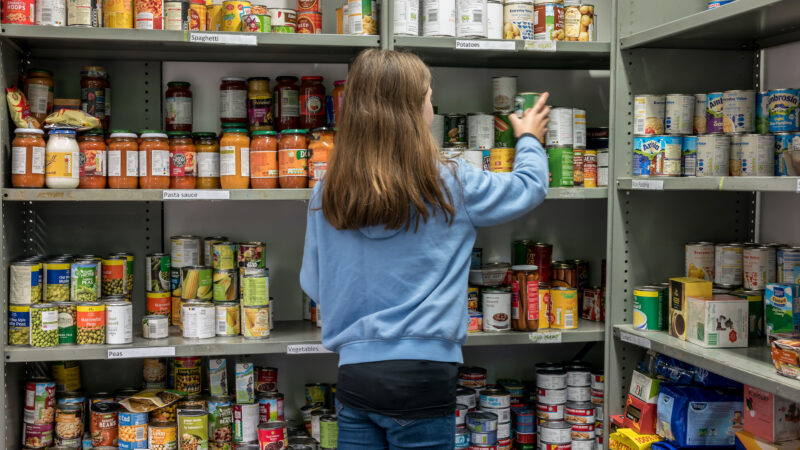
The rise of food insecurity in the UK is grim. The Trussell Trust reports that its network distributed 2.1 million emergency food parcels to people in crisis between April 1st 2021 and March 31st 2022; the network distributed some 60,000 parcels in 2010-11. Large-scale food bank dependence reflects economic failure. As the Archbishop of York said in his sermon at the Christians on the Left service at the start of this year’s Labour Party conference: “Increasingly, the safety net in our nation is a food bank, where more and more people have to go to get what our economy itself fails to provide.”
A key reason for the problem is the low current level of social security benefits. The annual family resources survey has started to track food insecurity among families. The first two years of data show that food insecurity among Universal Credit claimants fell from 43% to 27% when the £20-a-week uplift was in place. With the uplift removed – and Universal Credit now down to an historically low level – food insecurity is rising and hospital malnutrition cases are increasing.
Benefits were uprated by 3.1% last April, when inflation was nearly 10%. According to the House of Commons library, the current level of benefits is the lowest in real terms for 40 years. The normal benefit uprating formula uses the rate of inflation in the previous September – hence this year’s very low uprating. At the time, Rishi Sunak promised that the formula would be applied again next April. That means uprating by 10.1%. It is vital now that he keeps his promise. We will learn on November 17th whether he will.
The impact on children is particularly worrying. The work and pensions select committee – which I chair – has been inquiring into children in poverty. We know that poverty damages a child’s physical, mental and educational development. These disadvantages stay with children for life.
The Food Foundation has found that 3.7% of parents visited a food bank in the past month, and that 1.1 million adults and children live in those households. Four million children live in homes without adequate access to food. The Children’s Society’s Good Childhood report says that 85% of parents are troubled about the impact the cost-of-living crisis will have on their family.
During the pandemic, the government rightly extended free school meals to children from families with no recourse to public funds. Thanks to the campaigning efforts of Marcus Rashford, the benefits of this extended into the school holidays. This change has now, thankfully, been made permanent. But it is only the first in a string of changes needed. 800,000 children living in poverty are still not eligible for free school meals. The income threshold for eligibility is very low. Families in England have to earn less than £7,400 per year (after tax, not including benefits) to qualify. If they earn £7,401 per year, their children lose their free meals.
Tackling child poverty and food insecurity is morally the right thing to do – and it’s in everyone’s interests. Last year, child poverty cost the UK around £38bn. It is estimated that expanding free school meals to all Universal Credit claimants would generate £41.3bn for the economy. We would see the benefits of better academic performance, behaviour and lifetime productivity as children eat more healthily and obesity rates fall. We can already see those benefits in local authority areas like mine, the London borough of Newham, which has provided universal free school meals in primary schools since 2010. Families would save on average £37 a week, which can be invested back into the economy.
There is a real opportunity here to improve the health and lives of millions of families. Children consume one third of their food energy at school. 58% of families in poverty say they are buying less fruit and 48% fewer vegetables, but the state can strengthen the safety net with good food in schools.
Tomorrow, November 8th, the Food Foundation is hosting discussions at Westminster centre hall, near parliament, 1-4pm. Three panels will discuss working, cross-party, to deliver nutritious, accessible food to schools. Chefs in Schools – a charity working to provide tens of thousands of children with better school food – will also be serving healthy school meals to attendees. All MPs are welcome. The Food Foundation will be glad to provide more information. I am very much looking forward to it.
The government has ignored calls to extend free school meals to all households in receipt of Universal Credit. It has also gone silent on the Prime Minister’s previous promise, as Chancellor, to uprate benefits in line with inflation and rejected the work and pensions select committee’s call to make the £20 a week uplift permanent. But hunger is rising. We need a strategy to tackle this. There is no time to lose.




More from LabourList
‘It’s one year since I became Britain’s youngest MP. Here’s what I’ve achieved so far’
Tribute: ‘David Lipsey’s joie de vivre is missing in Labour politics today’
Ellie Reeves: ‘One year in, the next phase begins – focused on living standards’